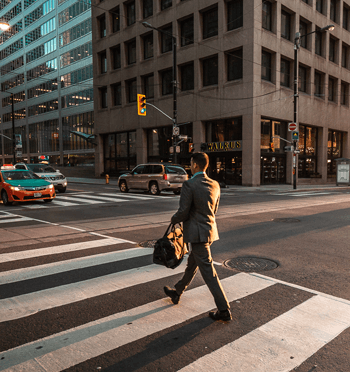


Copyright Registration
Working with thousands of business companies around the world for Ideas
The purpose of copyright registration is to place on record a verifiable account of the date and content of the work in question, so that in the event of a legal claim, or case of infringement or plagiarism, the copyright owner can produce a copy of the work from an official government source.
What is a Copyright?
Copyright is an essential part of the Intellectual Property (IP), and it is an exclusive right given by the law to authors or creators of artistic works, musical works, producers of cinematography films, sound recordings, etc. In fact, it is a bunch of rights consisting of adaptation, rights of reproduction, works translation, and communication to the public. There could be minor differences in the composition of the rights based upon the work. Copyright make sure that certain minimum protection of the author’s right over their creations, thereby safeguarding and rewarding creativity. Creativity being the foundation of progress, no enlightened society can afford to ignore the basic necessities of promoting the same. The social and economic development of a society is based upon creativity. The security offered by Copyright to the efforts of designers, writers, musicians, architects, and producers of sound recordings, computer software, etc., create an environment helpful to creativity, which persuades them to create more and encourages others to create.
REQUIREMENTS FOR COPYRIGHT REGISTRATION IN INDIA
- Two copies of the work to be protected under copyright registration.
- Name, address and nationality of the applicant.
- Nature of the applicant’s interest in the work.
- Title of the work.
- Name, address and nationality of the creator or author of the work and if the author is deceased, the date of his
death. - Year and name of the country of first publication of the work and name, address and nationality of the publisher.
- Year and countries of subsequent publications, if any, and names, address and nationalities of the publishers.
- Names, addresses and nationalities of the owners of the having rights in the copyright work and the extent of rights
held by each owner, together with particulars of assignments and licenses, if any. - Names, addresses and nationalities of other person, if any, authorized to assign or license the rights comprising the
copyright. - No objection certificate from the Trademark Registry.
- The applications should be signed by the applicant or the advocate in whose favour a Power of Attorney has been executed.
The Power of Attorney signed by the party and accepted by the advocate should also be enclosed.
Benefits and significance of Copyright Registration
- Copyright protection ensures certain minimum safeguards of the rights of authors over their creations, thereby protecting
and rewarding creativity. - An owner of the copyright work also has an advantage to either sell or agree for transferring his copyright to someone else
whether for free or on the basis of some royalty. - Copyright therefore encourages enterprise and creator of works to helping them to materialize their creative work.
- Copyright protection provides benefits in the form of economic rights which entitle the creators to legally get an appropriate
financial reward from activities such as making copies, performing in public, broadcasting, use on-line, etc.
Process of Copyright Registration in India
Copyright exists even without formal registration. However, to secure and reap actual benefits of copyright subject matter, it is
advisable to get the work protected under copyright registration. Certificate of copyright registration and entries made in the register
of copyrights serve as prima-facie evidence in the court of law that the work is copyright protected.
Different Status of Copyright Registration
The different status of Copyright Registration is as follows:
- Waiting
The term “Waiting” denotes that the Application for Copyright Registration is under a Mandatory Waiting Period.
- Formality Check Failed
The term “Formality Check Failed” denotes that the Documents not received after Payment.
- Abandoned
The term “Abandoned” means that the documents are not received after the Filing of the Application.
- Scrutiny
The term “Scrutiny” denoted that the application for Copyright Registration is under process.
- Re-Scrutiny
The term "Re-Scrutiny" denotes that the application for Copyright Registration is again under process.
- Hearing
The term “Hearing” denotes the hearing on the objection.
Rights of the Copyright owner
Right of reproduction
Copyright registration grants exclusive rights to the copyright owner. An individual cannot make copies or reproduce work without the permission of the copyright owner.
Right of Adaptation
The Act allows the creator to use his piece of work the way he wants to use it. He can create any derivatives of his original work. He can also use a different format based on his existing creation.
Right of Communication To The Public
The owner can broadcast their original work to the public. The copyright owner can use visual signs or even images.
Right of Public Performance
The owners of artistic and musical work can perform their works in public. A musician can play his piece of music for the people. An artist can perform in public or any platform the artist wishes to.
Right of Paternity And Integrity
The creators of original work are bestowed with rights of integrity and morality. The right of attribution or paternity implies that the creator can claim the sole authorship over his piece of work.
The right of integrity allows the owner to claim damages from the individuals. If anyone tries to mutilate, modify or distort the original piece of work, the copyright holder can claim the individual's damages.
Right of Distribution
The Copyright Act allows the owner to distribute his work in whatever form he likes. If he wishes, he can also transfer certain rights to another person to use the copyright.
Benefits of getting a Copyright registration
Provides Legal Protection
The Creators enjoy legal protection when their work is reproduced without authorization. Registering a Copyright makes it much easier to protect the original work against infringement.
Market Presence
Copyright registration creates a public record of the work, and proof of ownership is established for the creative work.
Rights Of The Owner
The owner of registered copyright gets the rights to reproduce, disseminate and adapt and translate the work.
Lawful Use of Copyrighted Work Without Permission
The law under certain conditions allows the use of a registered work without the owner's permission for research, study, criticism, review, and news reporting, as well as the use of works in libraries and schools and the legislatures. To protect users' interests, some exemptions have been prescribed in respect of specific uses of works enjoying copyright. Some of the exemptions are the uses of the work,
- For research or private study,
- For criticism or review
- In connection with a judicial proceeding
- For performance by an amateur club or society, if the performing for a non-paying audience and
- The making of sound recordings of literary, dramatic, or musical works under certain conditions.
Request a Call Back


Our Trusted Clients





